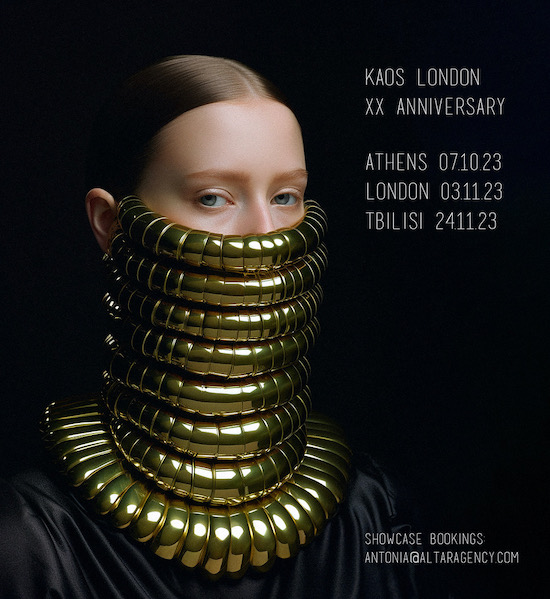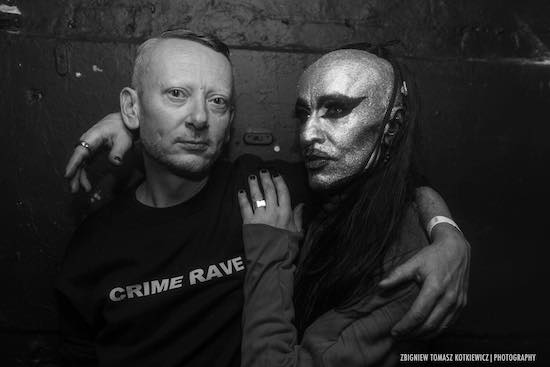Lee Adams and Dahc Dermur VIII
Music surrounds and suffocates, smoke and chatter curl about your form. It feels like energy and movement, frantic and calm. Headphones besmirched in white paint, a kaleidoscope of effervescent bodies, the Kaos regulars: Mune is adorned with a lampshade and floor length fringe (in their living sculpture phase), Artem runs about in a miniskirt cheekier than ever, Alicex stomps and storms with all of the clouds and thunder of a body becoming itself through flux, Our Lady of The Flowers, our dearest Dahc Dermur, a font of wit and wisdom borne of resistance and kindness. Alejandra and Aleksandra throw shapes unimaginable. And so many more, a cast of outsiders, my beauties pushing forwards, gliding through. Lee is playing his closing set. It’s a cathartic release.
I discovered Kaos shortly after my move to London in 2014. I’d come from a broadly industrial and goth background, nurtured by the wealth of musical offerings to be found from the North. Grateful for my Steel City and Cabaret Voltaire, Clock DVA, Artery, the musical deep dives and obsessions fueled by sparks flying from Forgemasters high windows at night. It was isolating though. It wasn’t until I moved to the Capital that I found a nightlife and community where the art that moved me felt truly represented. I quickly realized that Kaos was an event that embraced the full spectrum and complexity of my dreams of culture.
Esplendor Geométrico, Group A, Drew McDowall, Orphx, Polar Inertia, Ancient Methods, In Aeternam Vale, underground cinema casting shadows on the club walls, a procession of night flowers and air kisses, a family of outsiders, the warmth and wonder of a place to call home.
I felt validated, celebrated for my differences, and encouraged. I played my first event [Judith DJs under the name Proteus] there in 2016, and discovered a whole new world. It’s an intense and glorious affair, and to many it’s more than a club: it’s a utopian meeting ground for the night, where creative relationships are forged and long-lasting friendships are built.
It’s been a 20 year journey, of constant motion and evolution for Kaos. Founder Lee Adams has remained at the helm for its entirety, travelling from Madame Jojo’s, to The Speaker Palace, glorious days and nights at Stunners, the underground trans club where the rebellious nature of Kaos fit like a glove, to Elektrowerkz, and now to Fold. It sought out places to call home, amongst the kind of clubs that have truly cared for their communities. Kaos was supported by Mayuan Mak’s reign as the head of Electrowerkz, and the safe haven he provided for anti-establishment types of a perennially gothic peruasion, and now Fold founder’ Lasha Jorjoliani’s wonderful kindness and warmth. Kaos has remained at the forefront for underground, queer and dark culture in London. It’s become a world-renowned institution, representing truly uncompromising and original line ups, and creative integrity.
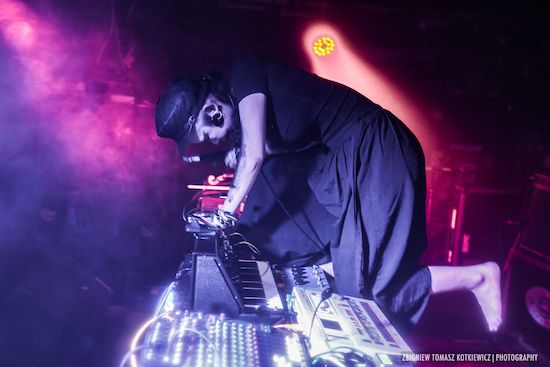
Its booking pulls from a legacy of body music, industrial, experimental electronic and techno, but I think one of the facets that sets it apart, is the community and artistic intent that defines the party. Nothing Is True, Everything Is Permitted. The black humour and cackling grapevine, amidst the Very Serious Industrial Music, is a thread of uniquely self-effacing and cheeky wit, never pomposity, only the most vivid and heartfelt artistic honesty, for all of the joy, and all of the desperate inescapable darkness. Kaos wears its heart on its sleeve, and for that I am truly truly grateful.
It’s been 20 years of Kaos. It’s a rare few clubs to reach a milestone like this, and I wanted to ask how the party has evolved over time?
Lee Adams: The party has evolved according to the spaces that have sheltered it, and the ecosystems that already existed within those spaces. It has also evolved in terms of scale and budget, which has enabled us to work with some of the finest artists in the world: but over all this time we have stayed very consistent with our aesthetics, both in terms of sound and image.
The world comes and goes yet Kaos remains, as a beautifully unique epicentre of underground dance. Is there a rhythm to the years, revolving cycles in the musical landscape that you see?
LA: There were times in the early years when our sound was heavily marginalised, the years of electroclash and minimal techno in the early 00s when it was difficult to even find much vinyl. I would spend days in record stores and leave almost empty handed, buying up collections from retiring DJs was often more profitable, turning up obscure gems from the late 90s when London had a proper techno scene.
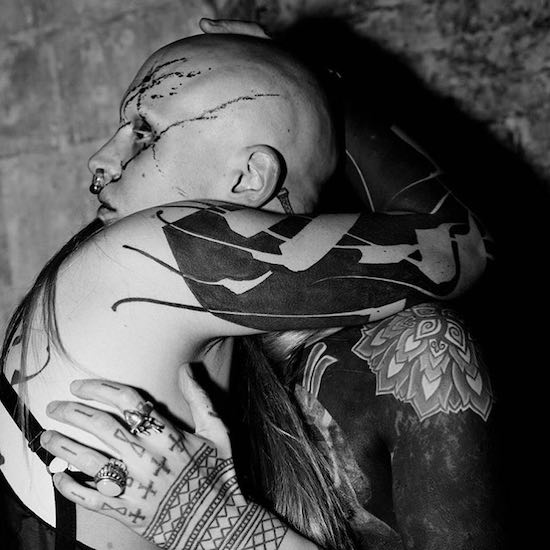
By the time we moved to Electrowerkz in 2014, the scene had caught on to the hard industrial sound that we spearheaded, and with digital production and distribution it has ignited like a wildfire and spread to every corner of the globe. Post-Covid there has been a move towards a kind of deathdrive techno, ultra-fast BPM, the sound of the void. We have certainly responded to this phenomena, but without yielding to it. I feel like it is another passing trend that will burn out soon enough.
Kaos has always felt a family affair, I’ve seen so many connections musically and artistically that have been borne from conversation on the dancefloor. How does it feel to have engendered such a creative incubator of a night?
LA: This ripple effect is our legacy I guess. The exuberantly sprawling queer techno scene in London and beyond, the myriad creative connections and collaborations that have formed over the past 20 years, are like seeds that have taken root and now bear their own fruit.
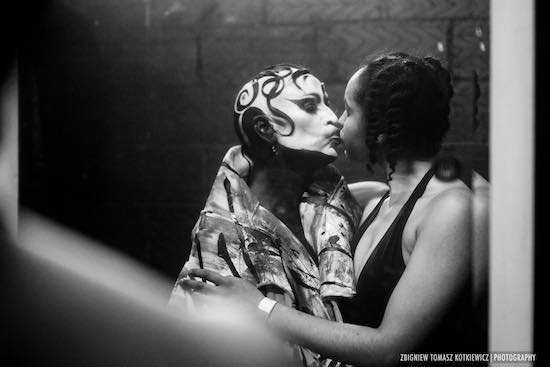
Could you tell us about some of the collaborations you’ve been happiest to witness, growing forth from this sense of connectivity?
LA: From the earliest years I invited Katsura Kan the Japanese Butoh dancer to perform at the first ever Kaos at Madame JoJo’s, we later became friends. I studied with him, and we performed together in the vaults under London Bridge Station (now the foundations for the Shard). Moving on I introduced Othon to Ernesto Tomasini which led to a long international collaboration with many performances and several releases. I’ve collaborated with Chadd Curry (Dahc Dermur VIII) over the past 10 years, on performances, photoshoots and club nights, guesting together for events such as Exist Festival, Howl and Body Movements. The Judgement Hall, an event series and festival founded by Sundip Aujla, was inspired and born out of his experience at Kaos, and the doors of perception that opened for him. Barkosina and Jerome from Years Of Denial met at Kaos, and subsequently started the project which is now returning to Kaos for our 20th anniversary on Friday 3rd November. More recently still, Sob Story the collaboration of Vilhelm and Oliver was born at Kaos, and has now led to a release on our label Khemia, and performances at FOLD and To Hell and Back, and of course my own collaboration SUTURE, with Pedro Merchan. He was studying at The Royal College of Music when he first came to Kaos, and now has turned his attentions completely towards electronic music, DJing, running his own event series, composing for television and producing techno both solo and with me.
You’re hosting a series of international events, in celebration of 20 years of Kaos. Can you give us some details?
LA: Some of the details are still under wraps but we are starting with KAOS X Unnatural Acts on Saturday 7th October at Temple in Athens, following on a few weeks later we have the London event at our new home FOLD, on Friday 3rd November with Years of Denial, Dahc Dermur VIII, Parma Ham and myself, on 24th November we are in Tbilisi and we continue the celebrations into our 21st anniversary next year with a showcase in Berlin on Mayday bank holiday.
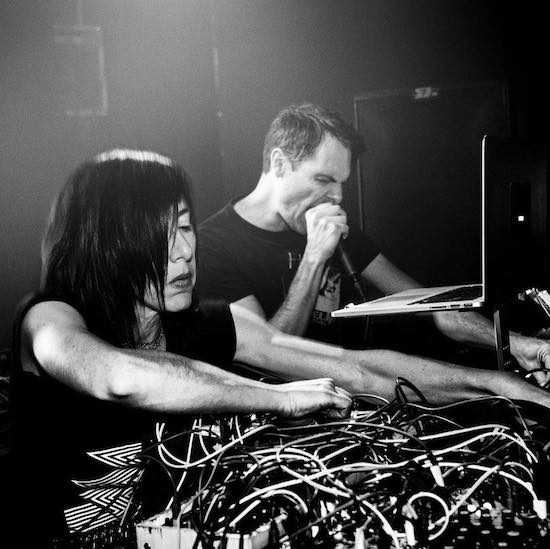
What is your creative vision, and your goals headed forwards from now. What drives you onwards?
LA: Keeping a pocket of resistance open in the face of the Brave New World. Connecting people, making stories, weaving magic, opening portals.
It’s all in a name, it feels so succinctly put, but what does Kaos mean to you?
LA: When I worked as an artist and curator, I was always interested in creating magical spaces: transformative experiences, authenticity, centrifugal forces, disequilibrium, vertigo, playfulness, reverie, catharsis and ritual. I now find ways to feed these energies into Kaos.
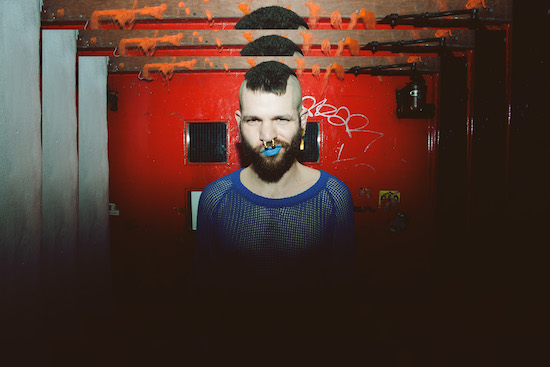
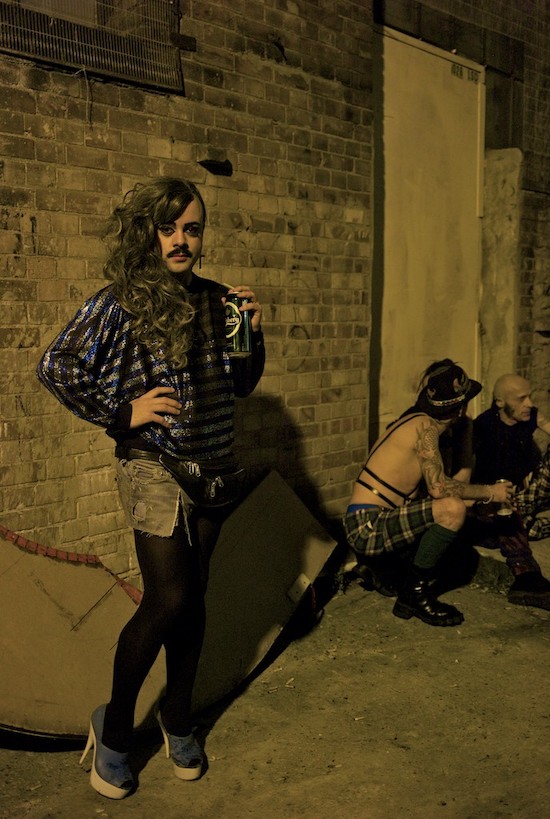
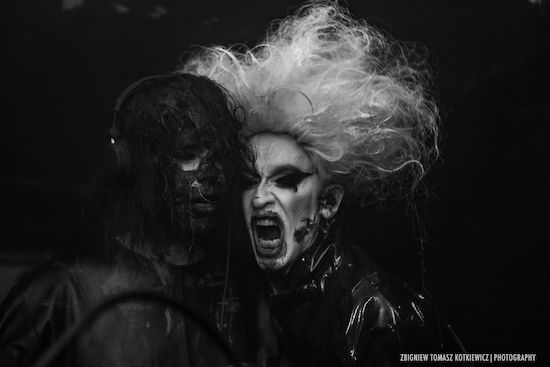
Find listings and tickets for Kaos events at their RA page
